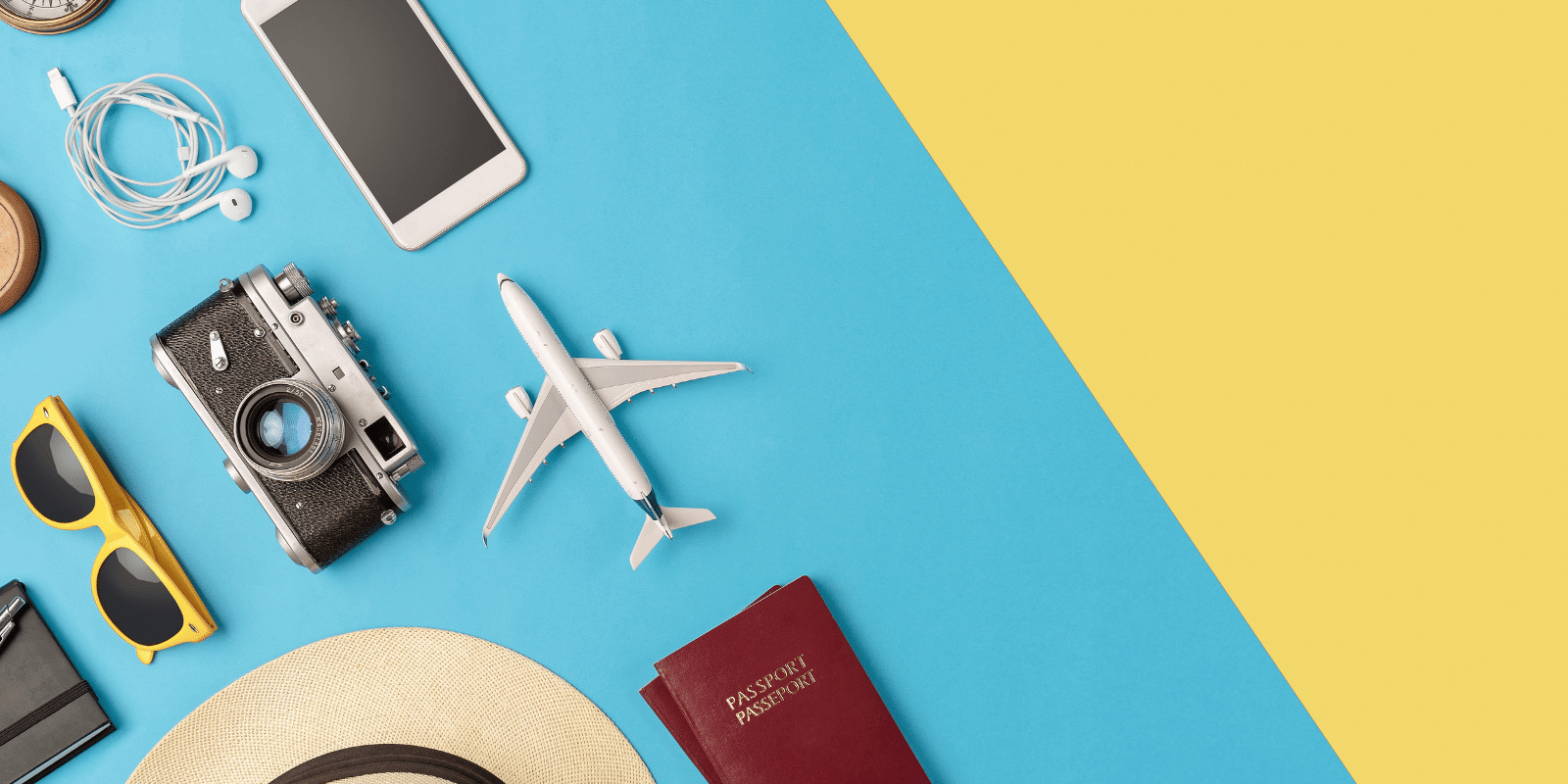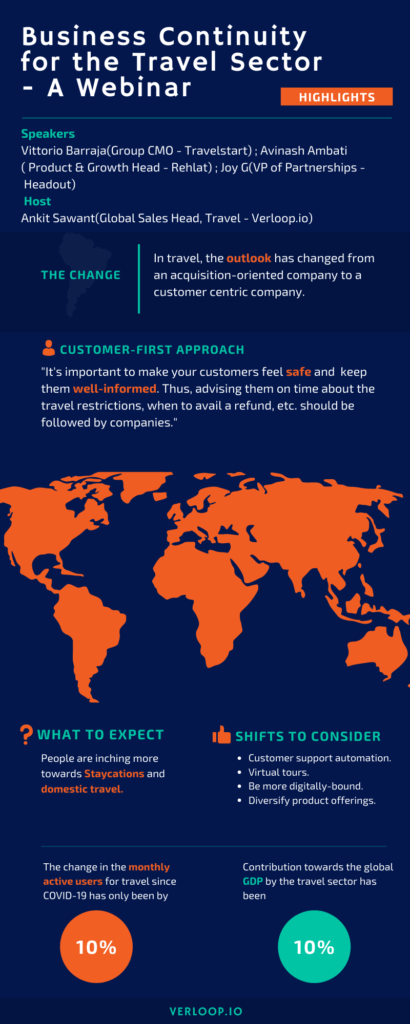Business Continuity for the Travel Sector – a Webinar

Business Continuity for the Travel Sector – a Webinar
We conducted a webinar on the 17th of September, where we were joined by industry veterans to discuss business continuity for the travel sector during COVID-19.
Several places to visit and experiences to cherish have always taken space in everyone’s bucket list. Traveling to a whole another country or revisiting places to open a jar of memories are something that most of us look forward to.
But, in the wake of the pandemic, the unexpected trips, planned vacations, etc. all came to a sudden halt. Flights and busses stopped, work from home began, and the need for safety rose massively.
We all know how the tourism industry has always been a huge contributor to the GDP, accounting for 10% of the global GDP. Thus, companies realized the need to maintain that figure and not waver from their long term vision.
But to do that, it was important to revive the industry by listening to the customers, reassuring them, advocating for safety, and bringing their love for travel back.
Hence, to get more insights into how companies are coping and preparing for the future, we spoke to industry leaders from the travel sector. Our aim was to understand the shift in customer demand, how businesses are building trust, and what to expect for the future.

Introduction to our panelists
Our panel consisted of speakers who come with tremendous experience in the travel space and hold a wealth of knowledge on the best practices in the industry and how to implement business continuity for the travel industry.
Plus, our very own Global Sales Head (Travel) – Ankit Sawant helped in driving the webinar to success by hosting an engaging session between our esteemed panelists and the enthusiastic audience.
- Vittorio Barraja: LinkedIn
- Avinash Ambati: LinkedIn; Twitter
- Joy Ghose: LinkedIn
- Ankit Sawant: LinkedIn; Twitter
The change brought on by Covid-19
With the frequency of buying in travel and OTA being lower than a company like Uber, marketing becomes a “must-have” investment to propel the company forward. Thus, since the advent of the pandemic, there has been a considerable shift in marketing for the travel industry.
Vittorio Barraja, Group CMO at Travelstart believes that the outlook has changed from an acquisition-oriented company to a customer-centric company. It has become more important to make the customers feel safe, welcomed, and keep them well-informed. Keeping that in mind, they introduced an interactive map, which allows the customers to see which zone is restricted, or a zone being wary of a travel ban.
This has actually helped companies stay in line with their long term vision, thus maintaining business continuity for the travel sector.
To fight the growing unawareness and in a bid to make the customers feel safe, Headout introduced a reopening tracker. This shows the places they can visit, updated restrictions, quarantine rules, etc.
And so, the Product and Growth head at Rehlat, Avinash Ambati agrees that safety and proactiveness are of utmost importance for the customers. It’s important to respond in time and not let the customers lose even a grain of trust.
The inevitable shift
Business Travel is something which has been talked about a lot. We saw Zoom from being valued at ~$19bn in Dec’19 to ~$115bn as of Sept’20. This was primarily driven by a shift towards online video conferencing due to the ongoing work from home setting.
Vittorio does agree that business travel will see a decline in the year 2021. Thus, video conferencing will see a sharp rise. But he also strongly believes that people are always willing to travel. And with the increase in demand for staycations now – where people can work from attractive locations, the love for travelling will only bloom.
Surprisingly, the number of active users has not reduced. There has only been a 10% difference in the monthly active users, says Avinash. Thus, travel will bounce back soon which will help champion business continuity for the travel sector.
Joy Ghose, Vice President of Partnerships, Headout, correctly points out that the term “Bleisure” is catching on. Which refers to the activity of combining business travel with leisure time. And with COVID-19 confining us to one place, people are on the lookout for newer locations to get a breath of fresh air.
Shifts that companies can consider, to grow
“To be more digitally bound. Companies can provide travel data, restricted areas, etc on their apps.”
– Joy Ghose.
“With the shift towards an online world, virtual tours create a lot of interest.”
– Avinash Ambati
“Diversify the product offering. Idea is to provide a unified experience to the customers”.
– Vittorio Barraja
Future-proofing to practice business continuity for the travel sector
With frequent changes and shifts, it’s also important to chalk out your long-term plan and implement something at present that’ll help you scale. With that in mind, companies in the travel space shifted to customer support automation.
Avinash agrees that companies can’t rely on humans while scaling up as the focus increases in making the initial TAT (turn around time) much quicker and satisfying the customers. This becomes difficult to achieve with a rapidly increasing customer base. He says that 100% automation is the vision, and within the next 3 years it can reach 70%.
Vittorio and Joy further add that chatbots are of huge help to the customer service agents. As they help in increasing efficiency and reducing repetition.
They state that the technological penetration within the industry is still low. COVID-19 will spur a need in companies to get on a platform, be tech-savvy, and automation-friendly.
Furthermore, to practice business continuity for the travel sector, Vittorio feels that it is important to make people understand the beauty of travel.
Suggested Reading: 7 Tips to Build a Travel Chatbot That Travelers Will Love
Audience Asks
Q. Middle eastern countries have decided not to give work visas to Indian countries.How do you think this will affect demand?
Avinash Ambati: It has already affected us. That’s why we are adding more revenue streams. Market size might reduce, but we can improve by shifting our focus towards other demographics – European, other middle eastern ones.
Q. How did you keep up with the ever-changing policies in the early days of COVID?
Vittorio Barraja: A lot of communication with customers has always been essential. We told them if they should postpone, avail a refund, or cancel; thus advising them throughout.
Q. Virtual tour programs – how will this affect traditional tours and travels?
Joy Gose: Virtual tours are available on so many platforms such as YouTube. This might not be a viable experience for the long term – as the question arises whether the customers will pay the same amount when they’re doing a virtual tour instead.
Q. As work from home gets normal, will new categories for locations evolve?
Vittorio Barraja: Yes. Micro-tours or local getaways are getting more important. Instead of taking a flight and traveling, a lot of people have started to look domestically, where they can visit attractions within their area of work/hometown.
Avinash Ambati: As we discussed, staycations are already on the rise. People are turning towards local getaways.
Q. What are the expectations from airport operators?
Vittorio Barraja: With the phase-wise re-opening, airports will set their own safety standards. Personally I feel that airports are possibly the safest places ever. The hygiene and safety ratings are over-the-top, especially during COVID-19.
Suggested Reading: The Need for a WhatsApp Chatbot for Travel – With Top 7 Use Cases
Parting notes
“Demand is coming back – more for regional and domestic attractions.”
– Joy Ghose
“Understanding the customer and providing them the correct information at the correct step is very important.”
– Avinash Ambati
“People should trust the travel agencies as a lot of precautions have been taken and end-to-end safety will be provided for the customers.”
– Vittorio Barraja
To catch the recording of the entire webinar, you can click here: Business Continuity for the Travel Sector- A Webinar.
Suggested Reading: Business Continuity Plan during Covid-19 for Ecommerce Industry 2020






